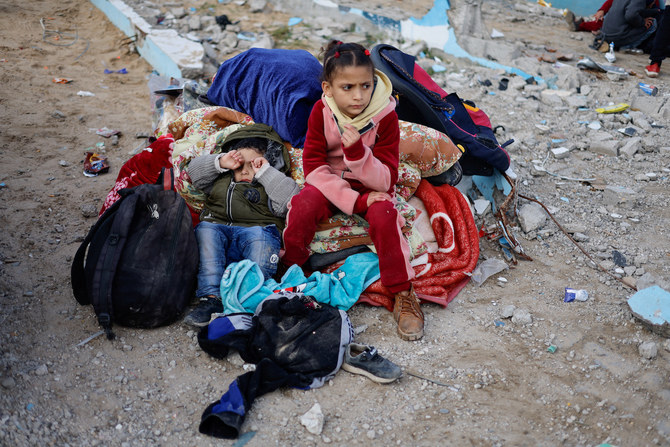JERUSALEM/DOHA: Israeli forces said on Thursday they had raided the biggest functioning hospital in Gaza, as video posted online showed chaos, shouting and the sound of shooting in darkened corridors that were filled with dust and smoke.
Israeli military spokesperson Rear Admiral Daniel Hagari described the raid on Nasser Hospital as “precise and limited” and said it was based on credible information that Hamas was hiding in the facility, had kept hostages there and that bodies of hostages may still be there.
A spokesperson for Hamas called Israel’s claim “lies.”
Health authorities in the Hamas-run enclave said Israel had forced out displaced people and families of medical staff sheltering in Nasser Hospital, with some 2,000 arriving in the southern border city of Rafah overnight and some pushing north to Deir Al-Balah in central Gaza.
The war began on Oct. 7 when Hamas sent fighters into Israel, killing 1,200 people, mostly civilians, and seizing 253 hostages according to Israeli tallies.
Israel’s air and ground offensive has since devastated tiny, crowded Gaza, killing 28,663 people, also mostly civilian, according to health authorities in the Hamas-run strip and forcing nearly all its inhabitants from their homes.
The UN humanitarian office had said on Wednesday that Nasser Hospital was besieged by Israeli forces with allegations of sniper fire at the facility, endangering the lives of medics, patients and thousands of displaced people.
The medical charity Medicins San Frontieres said people ordered by Israel to evacuate the hospital faced an impossible choice to stay “and become a potential target” or leave “into an apocalyptic landscape” of bombings.
Fighting at the hospital comes as Israel faces growing international pressure to show restraint in its Gaza war, after vowing to press its offensive into Rafah, the last relatively safe place for civilians in the enclave.
Attacks that have destroyed the majority of Gaza’s medical facilities have caused particular concern throughout the conflict, including Israeli raids on hospitals in other cities, shelling in the vicinity of hospitals and the targeting of ambulances.
As massive bombardment destroyed swathes of residential districts and forced most people from their homes, hospitals quickly became the focus for displaced people seeking shelter around buildings they thought more likely to be safe.
Israel accuses Hamas of regularly using hospitals, ambulances and other medical facilities for military purposes, and has aired footage taken by its troops that it says shows tunnels containing weapons below some hospitals.
The Israeli military said on Thursday it had apprehended a number of suspects at the Nasser Hospital and that its operations there were continuing.
Senior Hamas official Sami Abu Zuhri said Israel’s statement accusing the group of hiding fighters or keeping hostages at the hospital was “lies.” He added that “all previous Israeli allegations against hospitals had proven to be false.”
VIDEO SHOWS HOSPITAL CHAOS
Speaking about the hospital raid, Hagari said “this sensitive operation was prepared with precision and is being conducted by IDF special forces who underwent specified training.”
He said one objective of the operation was to ensure the hospital could continue treating Gazan patients and “we communicated this in a number of conversations we had with the hospital staff,” adding there was no obligation to evacuate.
Gaza health ministry spokesperson Ashraf Al-Qidra said Israel had forced doctors at Nasser hospital to abandon patients in intensive care there, putting their lives in danger.
Videos that Reuters verified on Thursday as having been filmed inside Nasser Hospital, though it could not verify when, showed scenes of chaos and terror.
Men walked through dark corridors using the lights from their phones, with plaster dust swirling around and debris lying in the corridors, at one point wheeling a bed through a damaged area.
At one point in a video gunshots rang out and a doctor shouted “Is there anyone still inside? There is gunfire, there is gunfire — heads down.”
Another man in a video said the Israeli army had surrounded the hospital and nobody could get out.
The World Health Organization has previously said half the medical staff of Nasser Hospital had already fled.
























